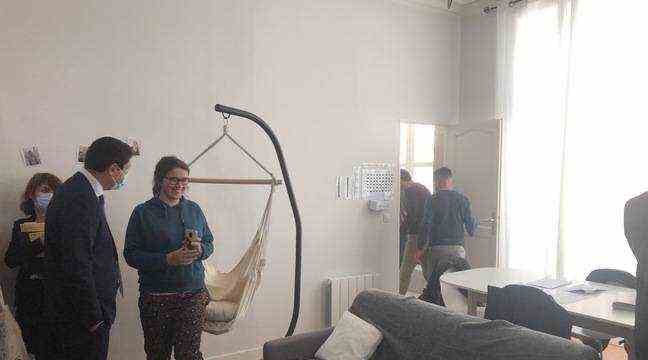The apartment is located in the historic center of Bordeaux. – E.Provenzano / 20 Minutes
- The ARI association, supported by the Gironde department, manages a shared apartment in Bordeaux, in which nine young adults with autism take turns.
- They have been getting to know each other there for a year by sharing activities and outings.
- The objective is to support them towards greater autonomy with, in 2024, a move into individual housing in a residence under construction.
“In my life, I have been very isolated so it helps me reach out to others and have contact with them”, explains Mathilde, 21 years old. She and eight other young adults with autism frequent a shared apartment run by
the Association for Rehabilitation and Integration (ARI), in Bordeaux and supported by the department. Located in the historic center, this beautiful two-bedroom apartment looks like a very organized shared flat. A table for the distribution of household chores is installed at the entrance to the kitchen and indications are displayed everywhere, so that the young people have the maximum of reference points.
“They share interests”
The apartment is occupied by nine young people who have taken turns there for a year. Mathilde spends one or two afternoons a week there. She already has her own apartment in Cestas where she lives during the week and returns to see her parents at the weekend. “I have a passion for football and when there is a match, I stay to sleep”, explains for his part Léo, 24 years old, who lives with his parents and appreciates having “made friends”, thanks to this shared accommodation.
“Social interactions among people with autism are still something special,” notes David Gimel-Servan, coordinator of the inclusive housing project. The goal is to take the time for them to get to know each other, using the game, a themed evening, meals, etc. After a year, the young people share interests and organize themselves afternoons together. He is present on a daily basis to help them structure their week and organize themselves for household chores and he also liaises with their educators, in charge of their medico-social follow-up.
Their own home in 2024
This experimental project should allow these young people to be as independent as possible in the future. “The idea is that in 2024, they each have their apartment in a residential complex under construction called the little Bruges and which will be built in particular by Mésolia, social landlord”, explains Dominique Espagnet-Veloso, general manager. of the ARI association.
The real estate project includes eight independent one-room apartments and a ninth with a vocation of conviviality so that young people help each other and organize a social life. We then understand all the interest there is in knowing and sympathizing before moving in. “The idea is that these young people tomorrow do not live in establishments but in individual housing, with as much autonomy as possible”, underlines the director of the ARI.
A model to follow
The department supports “around thirty shared housing projects, many around cerebral lesions,” argues Sébastien Saint Pasteur, chairman of the disability and inclusion commission in the Gironde department. “We are moving away from the model which consisted in estimating that people with disabilities should be in dedicated places but which are not necessarily integrated into society, there we are on the contrary in a logic of inclusion”, analyzes Jean-Luc Gleyze, the president of the departmental council.
The integration of these young people also involves employment and there too they are in a positive dynamic. “I finished a training course to be a horse-riding assistant trainer and trainer, and this week I am doing an internship in an A coeur et à crin association. At the end of the internship, she will see if she can take me on civic service or not, ”explains Mathilde proudly. Holder of a CAP in personal assistance, Léo applied to work in an establishment and service for assistance through work (ESAT), in laundry.

